
Picture this, A world filled with healthy connections and joyful relationships, and there are those special people who possess a special skill: People Pleasing, an ability to bring smiles to everyone they encounter; beautiful, isn’t it? But ever wonder what it does to the inner self of that special person? What if this desire to please others becomes a bit too much, like an avalanche of niceness? How would the person oneself personality reflect exhaustion? Restlessness? Sadness?
Let’s together uncover the concept and risk factor of people pleasing as the article takes off. This article will expose the effortless signs and dangerous risk factors of people pleasing. So whether you are a seasonal people pleaser or just a curious soul about the pleasing phenomenon, let's embark on this knowledgeful adventure together.
What is People Pleasing
The term People Pleasing also refers to “Approval-seeking”, which is a behavioral pattern in which any individual consistently practices prioritizing the desires and needs of others over their own. These people often go to great lengths to gain approval, appreciation, validation, and acceptance from their known person or sometimes from those around them. They carried out the pleasing task at the expense of their own personal boundaries and well-being.

Designed by Aditi
The concept of People Pleasing
People pleasing is based on a fundamental need or a rooted desire for human connection and societal harmony. It is based on the idea that being nice and agreeable will lead to a greater number of interactions and better connections. People pleasers often seek external validation as a source of self-worth, relying on the approval of others to feel valuable and accepted. Unlikely the act of kindness and gratitude, people-pleasing signified problems due to the chronic and compulsive behaviour of certain individuals. This might manifest in various aspects of life, such as family, relationships, or work.
While people pleasing might seems to be a selfless and noble virtue on the surface, it can have notable negative consequences on an individual's emotional and mental well-being. Constantly suppressing one's true self and neglecting personal needs can lead to feelings of resentment, burnout, and a lack of authenticity.
Pattern and reason for Saying yes

People Pleasers are no extraordinary people; they are just as regular beings as ourselves; They only struggle to say “No” or express their own opinion, which causes conflict within themselves, leading to the pattern of constant agreeableness. These people often fear rejection, disapproval, and conflict, which might be the core reason to drive them to avoid confrontation and prioritize others' needs and happiness over their own. This may be ingrained or rooted because of problematic childhood experiences, constant desire to gain love and attention, or other challenges from a young period. Over time pleasing or waiting for other people's approval becomes habitual and starts affecting the various aspect of their life. However, the scientific study subjectifies there are countless reasons why these people are adapted to pleasing others. The underlying reasons are
Reason #1- One of the primary reasons for people's pleasing is the fear of being rejected or disliked by others. They worry that if they don't comply with others' wishes, they might face disapproval or lose relationships.
Reason #2- A strong desire to be liked by everyone can drive people to say "yes" to requests, and it’s pretty common across our natural surroundings, even if this means compromising their own needs and values.
Reason #3- Some individuals might have grown up in environments where love and acceptance were contingent on meeting others' expectations, or they didn’t receive the affection as deserved. This conditioning can lead to a persistent need to please others.
Reason #4- People-pleasers often have a strong sense of empathy and compassion, which leads them to prioritize others' well-being over their own. They are adapted to think for other's happiness before their own
Reason #5- People-pleasers often seek validation and approval from others to feel accepted and valued. They rely on external feedback to boost their self-esteem and self-worth. Or they simply cannot face the challenges of saying “No.”
20 Signs of People Pleasing: Are you the one?
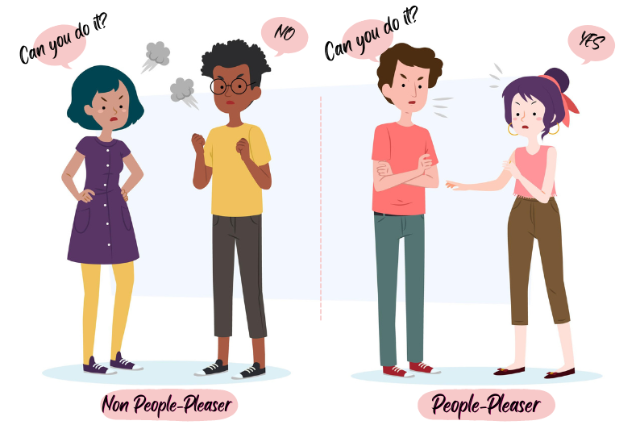
Can you imagine being someone who always tries to make everyone happy, a superhero spreading joy, but what costs you to be that individual? Are you someone who finds it hard to say “No” or always worries about others? If so, you might be a big-time people pleaser.
Prepare to delve into the depths of your emotion as I unravel the enigmatic signs that may just prove you are a people pleaser!
- You can’t say NO- Your tongue almost unconsciously creates a "yes" as if you're compelled by an invisible force to meet every request, regardless of your personal demands.
- Seeking Constant Approval- Your mood gets influenced by the approval you receive from others. Compliments from others are much like the fuel that keeps you running.
- Apologizing Unnecessarily- "I'm sorry" becomes your ultimate mantra, even when it isn’t your fault, even if you have done nothing or said anything. You apologize for your mere existence.
- Putting Others First- Your happiness is frequently relied on, ensuring that everyone else around you are happy. You place others' desires and joy much ahead of your own.
- Weight of other’s emotions- You constantly feel responsible for others’ emotions, and the weight of their feelings burdens your heart, eventually making you feel that you are responsible for making them happy.
- Fear of Disappointing Others- The mere thought of disappointing someone sends shivers downtown to your spine. You'd rather suffer brutally inside than see the disappointment in their eyes.
- Avoiding Confrontations- You hate to confront any arguments and confrontations, so you keep your ideas and opinions to yourself in order to maintain the peace, even if it means giving up your values.
- Constant Denial of Self-care- You forget to nurture yourself in between the constant need to nurture others and take care of other people's needs. Your cup runs empty, but you keep giving.
- Overwhelming yourself- You're continually balancing multiple tasks and commitments in order to please everyone. Time and energy are becoming increasingly limited resources while you keep falling overextending yourself.
- Phobia of Rejection- Fear of rejection paralyses your spirit, freezes your emotion, and leaves you with immense anxiety. This forces you to shape yourself to fit into the preferences of others or live as they please.
- Ocean of Insecurities- There's an underlying insecurity beneath your friendly façade; you run low on self-worth, And constantly see yourself as meritless or like you are not enough as you are
- Constant Comparison- You measure your worth by comparing yourself to others, always finding yourself falling short. You keep denying your character isn’t well as the others.
- Hiding under a mask- You wear different masks with different people, you don’t express yourself, and you are afraid of revealing your true self, fearing you'll be perceived as a burden.
- No help for you- You are the go-to person when others want assistance or support, yet you are hesitant to ask for help for fear of being perceived as a burden.
- Difficulty setting boundaries- For you, setting your boundaries feels like constructing big firm walls, so you let people enter your personal boundaries without limits, even if it drains you.
- Disbelieving in compliments- You think you don’t deserve compliments; Appreciation leaves you uneasy and confused, making you wonder if you deserve them at all.
- Ignoring your dreams and desire- You don’t feel a need to prioritize your aim or personal goal. Your personal dreams and aspirations often take a backseat as you dedicate yourself to fulfilling others' desires.
- Feeling void- No matter how hard you try to please other people around you, despite all of your efforts, you still can’t shake the feeling of void, emptiness deep within yourself. So, you keep feeling other pleasing acts.
- The repay feeling- When someone does something nice for you, you feel indebted to repay them or do the same in return, even if it is unnecessary and goes beyond your comfort zone.
- Obligations- You may also feel guilty or compelled to make everyone happy, thinking you are letting others down or not doing enough for them. The sense of obligation pushes you to please others.
Faces of People Pleaser
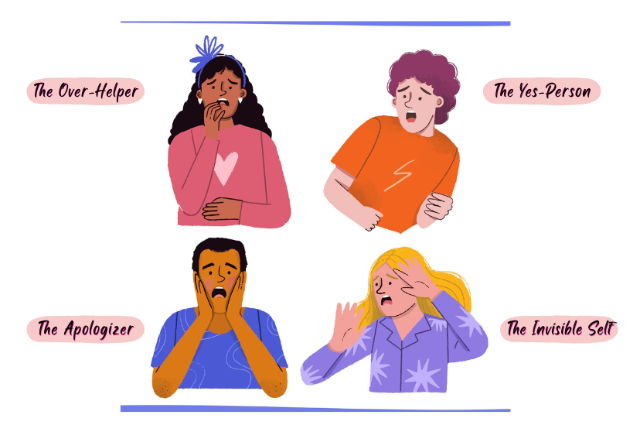
As I said, People pleasers are not much different from ourselves; they can be you, me, or anyone; however, their faces depending on their behavior patterns can be quite diverse. As their actions and sentiments can vary depending on the specific situation and the people involved, so does their personalities or faces. Here are some typical faces or characteristics of a people-pleaser that you should know of.
The Yes-Person
The habitual saying “Yes” to every request
The Apologizer
The one with excessively apologizing
The Chameleon
The flexible one with a different personality to fit in
The Eager-to-Pleaser
The constant pleasing of every one individual
The Over Helper
The one going above and beyond to help others
The Emotional buffer
The suppression of their own emotions person
The Perfectionist
The one with the urgency feeling to be perfect
The invisible Self
The concealer of their true self and emotions
The Approval-Addict
The one with an addiction to other’s reinforcement
The always smiler
The enthusiasm with the bright smile and overwhelming feeling
The Risk Factor of People Pleasing
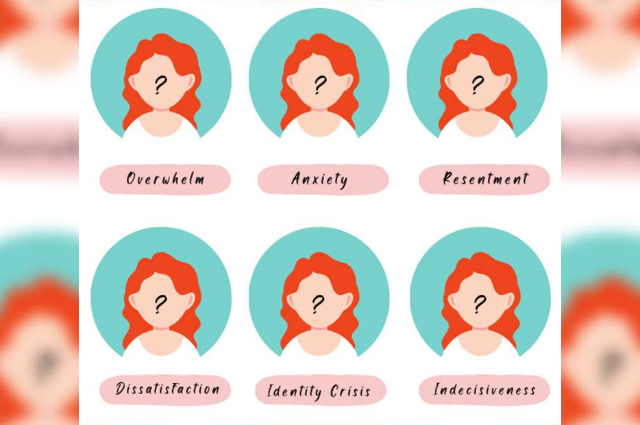
Designed by Aditi
No matter if “People pleasing” sounds positive enough or is often driven by good intentions, it’s the hazardous trait that drives out the energy of individuals, leaving them stressed all the time. The act of pleasing everyone can lead to several risk factors and negative consequences for that ideal being. Here are some significant risk factors associated with the same.
* Emotional Exhaustion: Constantly prioritizing others' needs over one's own can lead to emotional exhaustion, leaving the individual drained, spiritless, and overwhelmed.
* Resentment- Suppressing one's desires and neglecting self-care while keeping others above may foster feelings of resentment and bitterness toward self over time.
* Identity Crisis- Seeking acceptance from others all the time might lead to uncertainty. This may lead to severe confusion about one’s own identity and values.
* Impact on Mental Health- Keeping one’s emotions and needs behind the curtains all the time while prioritizing others first might lead to serious damage to mental health, contributing to anxiety, depression, and stress.
* Disconnection from self The constant practice of pleasing others can cut your direct connection to self; Eventually, individuals lose touch with their own desire and passions.
* Unable to handle criticism- The people-pleasing emotions depend on others' validation, which is why they struggle to handle criticism because they believe it makes damage their self-image.
* Ceased Growth- Focusing solely on pleasing others may lead to neglecting personal development and growth opportunities. This will lead to burnout and decreased productivity.
* Trouble decision making- The constant fear of disappointing others may make it challenging for people-pleasers to make decisions, which make them indecisive in their personal life as well.
* Unhealthy coping- People-pleasers may use dangerous and unhealthy coping techniques to deal with their emotions, such as avoidance or denial. This is because they are adapted to a certain mindset.
* Lack of authentic connection- The people-pleasing individual keeps engaged in looking out for people's cues about their need and opinion about self and forget to forge a real connection or neglect the transparency
Feelings that a people pleaser faces every day
People-pleasers often experience a wide range of feelings and emotions due to their behaviour and tendencies. Let me give you a brief about how a person drowns in tons of people and emotions with a more realistic example.
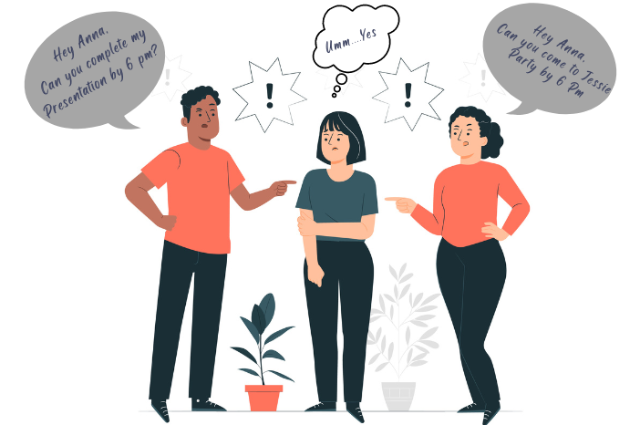
Let’s Meet Anna,
A talented young and beautiful woman who is successfully positioned as Senior Director in a bustling MNC. In between her thriving career, she was blessed enough to return home to the cozy surroundings of her loving nuclear family. Comprising charming traits and empathy, Anna has driven a wide friend circle; behind her radiant smile lies a unique struggle- A feeling to make everyone happy and pleased around herself.
From her colleagues' projects to family gatherings, Anna can't resist the urge to say "yes" to every request. She constantly strives to keep everyone content, putting her own desires on the backburner when she is out at a party or social gathering. Amidst immense admiration for her selflessness, Anna grasps emotional exhaustion and a sense of losing her true self every time she closes her eyes.
From taking on an unplanned project from her boss to going on a certain trip forced by her family or simply ordering food she didn’t like at her friend's outing, Anna’s life as a big people pleaser is a rollercoaster of emotions. There are tons of underlying emotions that keep drowning her.
Anxiety- Anna constantly worries about meeting everyone's expectations, fearing she might disappoint or let someone down. Like
Anna’s pulse speeds up as she considers refusing the last-minute assignment because she is afraid her coworkers would think less of her.
Guilt- Saying "no" feels like a heavy burden she has to carry, leaving Anna feeling guilty for not fulfilling every request. Like,
Last night she spent the whole night at her friend’s bachelorette even though she had an early morning flight because she feared and felt guilty about hurting her friend’s feelings.
Insecurity- Anna often doubts her abilities and worthiness among others, wondering if she's doing enough for others to truly be appreciated. Like
Anna hesitates to share her creative ideas during the team meeting, keeping them to herself, worried that they wouldn't be as good as her coworkers'.
Overwhelm- Wandering between multiple commitments becomes a daily struggle, leaving Anna feeling extra overwhelmed. Like
As she juggles her family dinner night, a promotion party of a colleague from a different department, and a friend of a friend’s birthday party, Anna feels overwhelmed, wondering if she can handle it all.
Dissatisfaction- Despite her efforts, Anna can't shake the feeling of dissatisfaction, thinking all she does is not enough, as she neglects her desires. Like
Despite receiving compliments on her marvelous presentation, Anna can't help but feel dissatisfied, wondering if she could have done better.
Fatigue- The weight of constant people-pleasing drains Anna on a daily basis, both emotionally and physically, leading to persistent fatigue.
After attending back-to-back social events that she didn’t want to attend, Anna kept feeling emotionally drained and physically exhausted.
Lonely- Surrounded by friends, family, and colleagues, Anna feels isolated, fearing that nobody truly understands her true self. Like
She puts on a brave face at the family gathering, but deep down, she feels lonely, unable to express her true emotions.
Self-Doubt- Anna’s constant need for validation from others fuels self-doubt in herself, making her question her decisions and choices at work, home, or out. Like
Before buying a dress or putting on her makeup, Anna seeks validation from multiple people, doubting her ability to choose wisely.
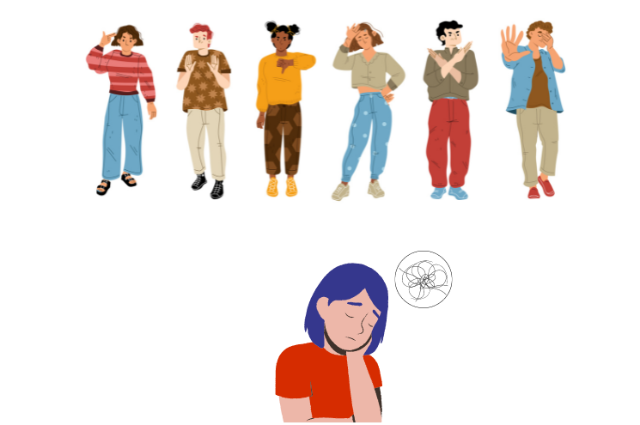
So, don’t be an Anna; break free from these toxic traits and embrace your authentic self. Learn to build healthy boundaries and say “No “when necessary. Remember, like all of the other beings, you, too, are worthy of happiness and love just as you are, and you don’t have to win it from other people.
So, embrace your true self and forge a healthy connection with yourself.
It's time woke up; Put an end.
Remember, People, Pleasing is not a personality flaw, but It's essential to strike a healthy balance between caring for others and prioritizing one's own well-being. If you desire to embrace your own happiness, acknowledge your inner self, and nurture a healthy relationship with yourself, you need to break free from the chain of people pleasing; you can unlock a life with sell-fulfillment, joy, and tranquility.

There are few practices you can adapt to break free; Acknowledging your people-pleasing tendencies is the first step towards change. Embrace your empathetic nature, but also recognize the importance of self-compassion and self-prioritization. Certain primary factors that help you overcome this character are.’
• Acknowledging yourself and understanding the triggers that lead you to people-please.
• Practising Self-awareness, Observe your behavior and emotions without judgment
• Say No, because it doesn't make you selfish, and It’s okay to decline requests respectfully.
• Identify yourself, Peel off the masks you've been wearing, and embrace your authentic self.
• Respect yourself, define your boundaries, and communicate them assertively
• Prioritize self-care; nurture yourself with the same love and care you give to others.
By taking one small step at a time, we can cultivate a joyous life free from any negative traits. Adapt to these small steps towards freeing yourself while I prepare to unveil the secrets to embrace your authentic self. Discover the path to liberation from people pleasing in my upcoming article. Stay tuned for an empowering journey to self-discovery.
Important Note- In the world of acceptance, it's utterly necessary to remember that people-pleasing is a very common trait that many of us share. So, let's avoid that from turning into a big hype but foster a compassionate environment where we support each other regardless of our personality. Rather than judging who engages in pleasing people, let’s encourage them to open conversations and lend a helping hand. Let’s lift each other and embrace our true selves.
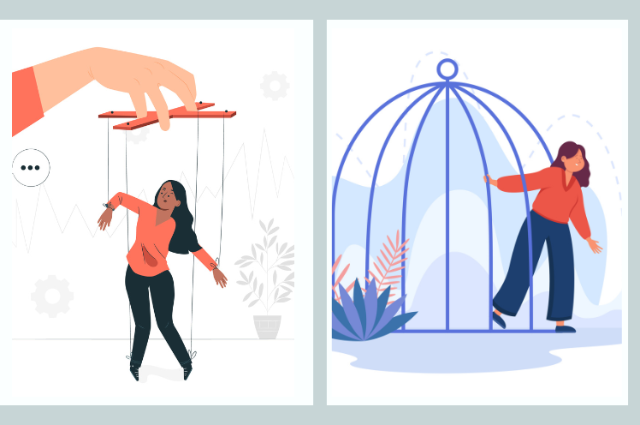
Final Words
While the desire to please others is a natural human trait, it is essential to find a healthy balance that includes prioritizing one's own well-being; Don’t you think? After a deep evaluation of the signs and dangers of People pleasing, aren’t you on the urge to break free from the cycle and embrace your healthy and happy self? To take the big step towards so, one must acknowledge the people-pleasing signs and associated risks and then set boundaries to value yourself more than others in order to nurture growth.
